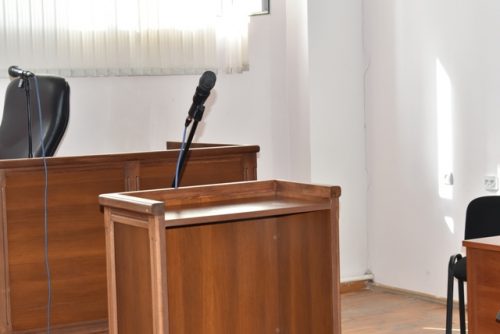The Judicial Department has not discussed the matter of conducting all the court sessions remotely.
All the RA courts have audiovisual equipment to conduct remote sessions. As of May 8, 30 halls were equipped with these devices. However, it is not known how many sessions on which cases were conducted. It is also unknown what principles are in place to choose which case session should be conducted remotely and which case session should not. The matter of conducting all the sessions remotely has not been discussed.
This information was given to HCA Vanadzor by the RA Judicial Department.
On 25 March 2020, the Supreme Judicial Council announced that in all the RA courts, at least one session hall was equipped with the necessary audiovisual equipment and the remote communication system was launched.
A month after the announcement, HCA Vanadzor sent an inquiry to the President of the Supreme Judicial Council to find out whether all the RA courts had been equipped with the necessary equipment, how many halls had been equipped altogether, how many sessions had been conducted remotely during that period, what type of cases were conducted remotely, what principle was in place to choose cases subject to remote examination and what steps were being taken to conduct all the cases remotely.
On 8 May 2020, Karen Poladyan, Head of the RA Judicial Department, replied to the inquiry. He informed that all the RA courts, a total of 30 halls had audiovisual equipment, for which AMD 45,200,000 had been spent. As K. Poladyan stated, the sessions conducted remotely had not been counted and it was also not clear what principle was in place to choose cases subject to remote examination.
The Judicial Department has not discussed the matter of examining all the cases remotely.
By the way, the Supreme Judicial Council mentioned in the same announcement that circulation of documents with courts could also be held remotely via emails and its is established by law. However, in the frame of one of HCA Vanadzor cases, the plaintiff made an application to conduct the session in his absence and the Administrative Court refused to conduct it electronically.
In another case, the Court refused the plaintiff’s application to postpone the payment of state duty, though the latter reasoned that banks did not work and he did not have an opportunity to pay online.
In regard to the possibility of conducting court sessions remotely, we should state that during 16 March 2020 – 15 May 2020, 35 court sessions were scheduled in judicial cases conducted by HCA Vanadzor, and in 8 cases, delivery of judgment was scheduled. However, only 9 court sessions were conducted.
6 more sessions were postponed at the initiative of HCA Vanadzor advocates, as the conduction of the sessions presupposed a big number of people in the hall; 13 sessions were postponed at the initiative of courts; 5 sessions were postponed for reasons not related to coronavirus; 2 sessions were postponed by the petition of the other party to the proceedings; in 3 cases, the Organization’s representatives made an application to conduct the sessions in their absence.
In May 12 response to our inquiry on pandemic-driven measures, A. Stepanyan, Deputy Head on financial-economic matters of the Judicial Department, informed that 31 projectors and 30 cameras had been obtained to conduct some sessions remotely.
In regard to the measures aimed at preventing the spread of the virus, A. Stepanyan mentioned that since March 16, they had purchased 1195 litres of disinfectants from various manufacturers and importers in order to disinfect courts, as well as 13,000 pairs of gloves and 10,000 masks had been bought and distributed them to courts. According to the answer, the whole territory of the Supreme Judicial Council and administrative court buildings is disinfected with thermal aerosol generators and disinfectants.
We also asked how the control over those measures was held. A. Stepanyan assured that the process was under the immediate control of the Head of the Judicial Department.

